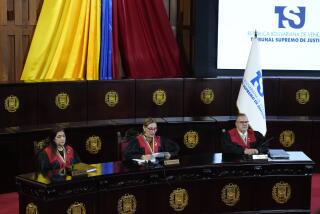Egyptians overwhelmingly approve constitutional changes
Egyptians moved further beyond the legacy of former President Hosni Mubarak’s strongman rule by voting overwhelmingly to amend the nation’s constitution and head swiftly toward parliamentary and presidential elections, according to results of a referendum announced Sunday.
The referendum, which calls for judicial oversight of elections and limited presidential terms, was the first step to bring Egypt closer to a democracy after decades of corrupt one-party rule. The outcome is expected to spur chaotic, if exciting, races for parliament and president in coming months.
The measure passed with 77.2% of the vote. More than 18 million voters, or about 41% of those eligible, cast ballots nationwide Saturday.
In addition to limiting presidents to two four-year terms, the constitutional changes will eliminate restrictions on the formation of political parties and require a popular referendum before the country’s controversial emergency law, often employed to limit dissent, can be used for more than six months.
The result was a victory for Egyptians wanting to seize the momentum from the Jan. 25 revolution and elect a civilian government to replace the military now ruling the country. The generals have public support, but many Egyptians have grown wary of the army’s influence over the state.
“I’m happy,” said Hater Maher, a 24-year-old university student. “Those amendments should be enough to govern the country for the next few months. We needed them to prepare for elections.”
The losers in the poll were reformists such as Nobel Peace Prize laureate Mohamed ElBaradei, who cautioned that the nation was not politically mature enough to field elections as early as June.
The concern is that fledgling political parties, including those formed by young activists, will not be organized in time to compete with more established organizations, such as the Muslim Brotherhood and the former ruling National Democratic Party. Critics said the referendum lacked sufficient breadth to reform the Arab world’s most populous nation.
“I’m disappointed but it was a democratic process and I have to accept the majority,” said Ahmed Magdi, a 29-year-old shop owner. “We did not need a referendum so soon after the revolution. We’re not ready to decide something so important.”
Hassan is a news assistant in The Times’ Cairo bureau.
More to Read
Sign up for Essential California
The most important California stories and recommendations in your inbox every morning.
You may occasionally receive promotional content from the Los Angeles Times.










